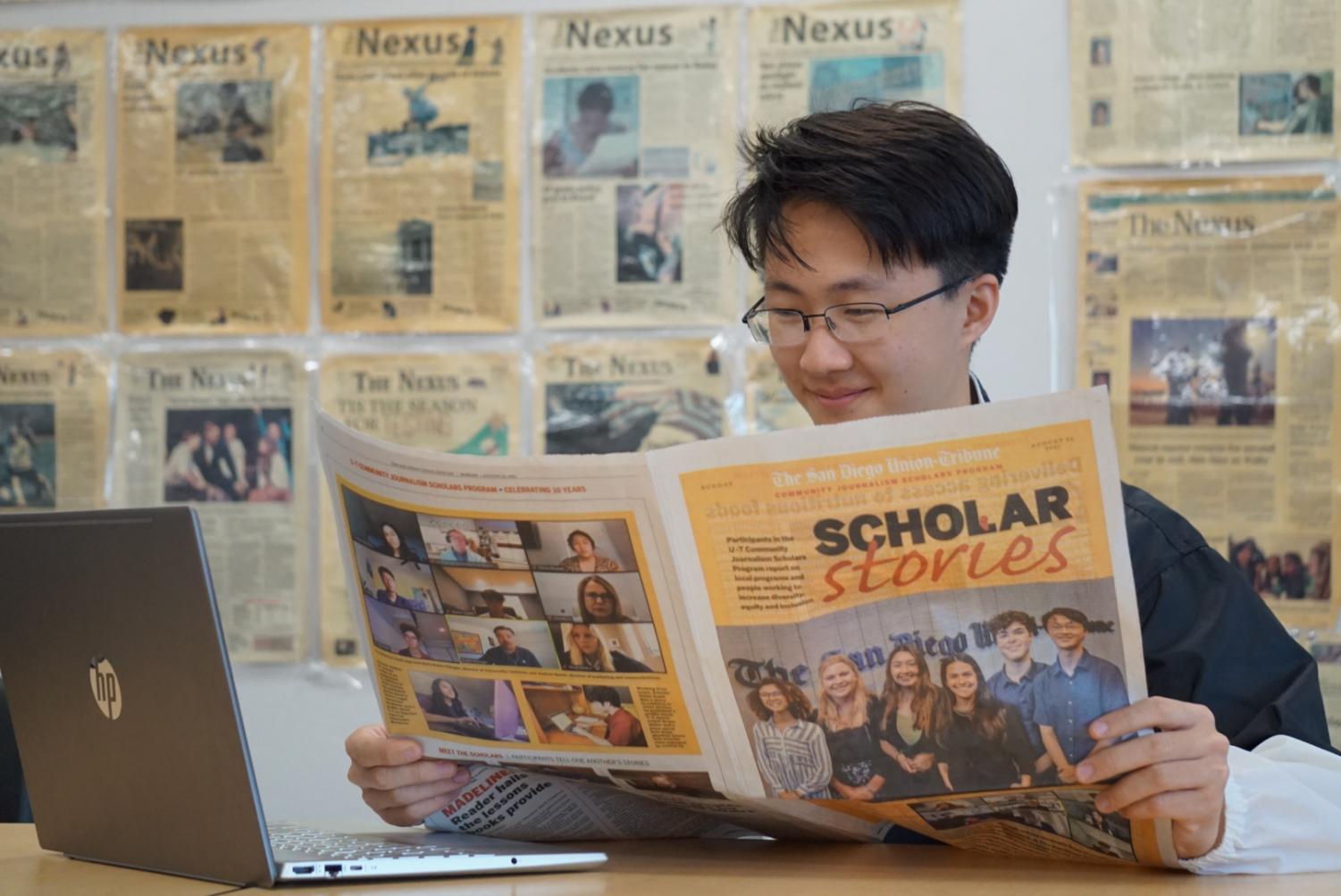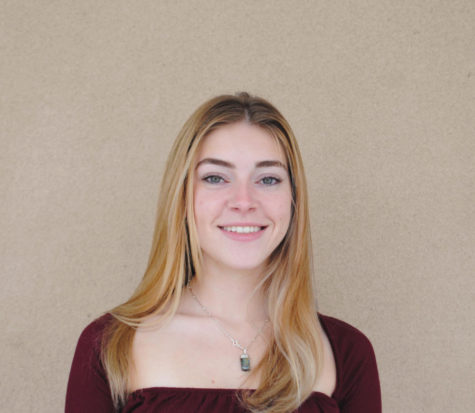Si writes for Union-Tribune, earns scholarship
August 27, 2021

Ever since he joined The Nexus his sophomore year, the rest of his staff members knew that the world needed more journalists like YJ Si (12). His editors knew it. His newspaper adviser knew it. Practically everyone around him knew it—except for Si himself.
It wasn’t until he had to hear it from a stranger—a curious volunteer that struck up a conversation with Si while scanning the names imprinted in the Vietnam Memorial in Washington D.C—that he began to realize his true potential and desire to pursue a career in journalism.
This summer, after serving on The Nexus staff for two years and gearing up for his third, this time as editor-in-chief, Si was prepared to take his passion to greater heights and put his journalism skills to the test. Out of 58 applicants, Si, along with five other students from high schools across San Diego, was selected to participate in the San Diego Union-Tribune’s Community Scholars Program.
The program—which took place primarily through Zoom due to COVID-19 restrictions—allowed the scholars to explore both news and feature writing under the mentorship of journalists at the U-T, and publish multiple articles in both print and online issues of the Tribune over the course of five weeks.
According to Si, he felt that getting the opportunity to write for a major metropolitan newspaper would provide insight into the demanding nature of professional journalism.
“I wanted to join this program was because I knew how stressful being a journalist could be, and I wanted to see if that’s something I could handle,” he said. “And obviously, the internship doesn’t exactly replicate a real job, but it’s the closest thing to it.”
Despite Si’s initial apprehensions regarding the intensity of the program, he found that his background with The Nexus, along with his mentors’ careful guidance, made for an easy transition into a professional setting.
“Most of the first week on the job was just getting everyone up to speed about what journalism actually is, because they don’t actually require you to have a background in journalism to be a part of the program. So turns out, I was actually the most experienced person there, which was surprising,” Si said. “Most of the stuff I really learned in the first week was a lot of the little technical details. For example, they’re not as strict with the way you’re supposed to write things—they have some general guidelines, but because you have actual editors that your articles are getting passed around to, you don’t need to worry so much about getting things right the first time.”
By the second week of the program, the scholars received their first official assignments for publication—writing news reports on San Diego County supervisors’ recent approval of green-sector internships and community grant programs.
“For our first two articles, we were all assigned the same subjects to write about,” Si said. “They had us attend a board meeting or listen to a podcast, and report from that. So each of us wrote ours a little bit differently, but the news was all the same.”
Moving into the third week, the scholars had switched gears from news reporting to feature writing—an area of journalism that Si hadn’t typically gravitated towards in the past.
“Before the internship, the only feature I had written turned out kind of disappointing because I knew there was so much more to the person I was writing it on but I didn’t know how to dig deep as a young journalist,” Si said.
Despite his limited background with writing features, Si says his favorite article he published in the tribune and his best work to date transpired when working on community features in the fourth week of the program.
“For last year’s program, their theme for the community feature was how different groups in the community were dealing with the pandemic, so this year’s theme was more centered around what they’ve learned now and what they’re doing to come out of it,” Si said. “I knew my violin teacher mentioned that she had started getting more gigs recently, so that gave me the ideas to write a feature on two musicians, and what getting gigs has been like since the pandemic and what they’ve done to continue their art.”
With the help of the Union-Tribune’s Arts and Culture reporter, Si was able to get into contact with professional musicians Gregory Page and Whitney Shay. According to Si, his interviews with both musicians were helpful in developing his interpersonal skills as a journalist, thus enhancing the quality of his reporting.
“I think at this point my interviews don’t feel like interrogations, they feel like real conversations,” he said. “Now, after talking to someone with more easily exposed stories, I was able to dig deeper into the piece and my subjects’ perspective so now I have a lot more confidence in myself to be able to find those stories beyond just knowing where to look.”
Since completing his internship, Si’s feature on Page and Shay has been published in both print and online issues of the U-T, making him the first scholar in the history of the program to have his work published in the newspaper’s Arts and Culture section, rather than a local section.
At the end of the program, Si was awarded a $5,000 scholarship of overall excellence—a scholarship that he says he was completely unaware of prior to receiving it.
“I had no clue that this scholarship even existed actually,” Si said. “After five weeks when the program was ending, they invited us to eat lunch with them. When they handed me the manila envelope at the end of lunch, it completely caught me by surprise.”
Despite his $5,000 check, Si said he felt he gained something far more important from his experience with the community scholars program—greater clarity on the path of journalism he hopes to pursue. While Si had previously planned to become a political investigative reporter, his newfound passion for features writing helped him realize that staying local and focusing on building trust in his community would be far more fulfilling.
“Through the internship and getting to interview people and write features on them, I realized that what I like most about being a journalist isn’t uncovering these investigative stories, it’s just getting to talk to people,” Si said. “It’s giving a piece of myself to someone and getting a piece back. It’s just making connections and being able to explore what it means to live someone else’s life.”


